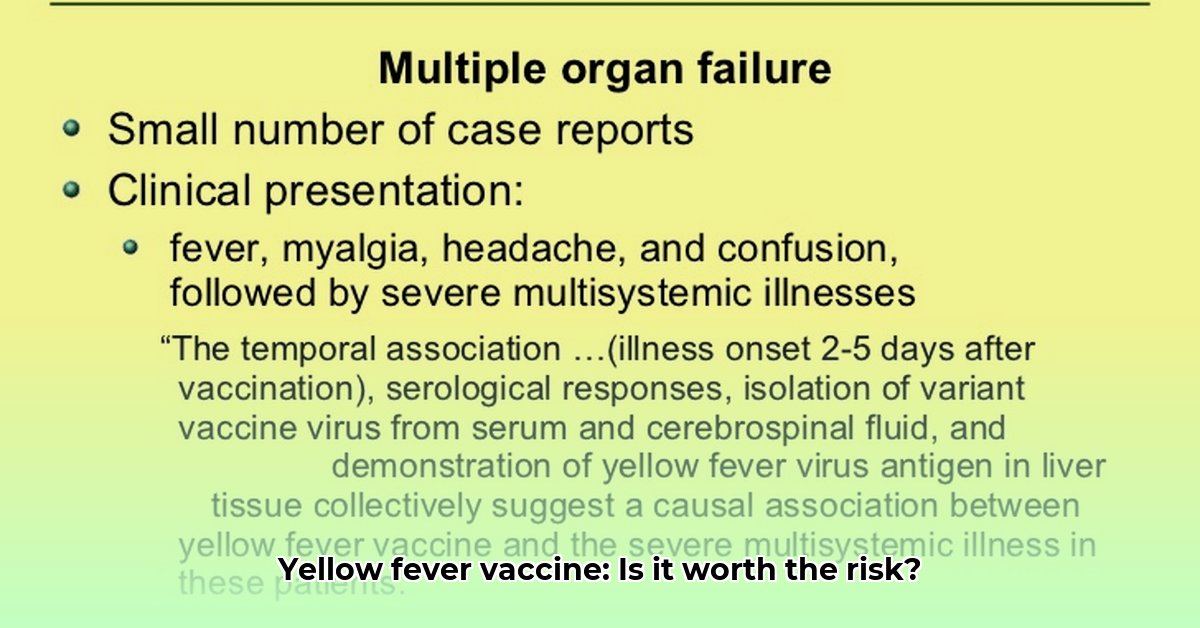
Understanding Yellow Fever and Vaccination
Going to a place where yellow fever is a risk? Getting vaccinated is usually a brilliant idea, tjop! Yellow fever is a serious, sometimes deadly disease spread by mosquitoes. The vaccine is highly effective, offering excellent protection. But, like any jab, there's a chance of side effects. This guide will help you understand these side effects, and make an informed decision about getting vaccinated.
Vaccine Efficacy: How Well Does It Work?
The yellow fever vaccine is exceptionally effective, with a protection rate of close to 99% against the disease, according to the World Health Organisation (WHO) and the Centers for Disease Control and Prevention (CDC). This high efficacy makes vaccination crucial, even though side effects are possible. Is that solid enough for you, ou?
Side Effects: What to Expect
Side effects range from mild to severe. Most people only experience mild symptoms, such as:
- Fever
- Headache
- Muscle aches (myalgia)
- Fatigue
These usually clear up within a week or two. However, serious side effects, though rare, can occur. These include:
- Anaphylaxis (a severe allergic reaction)
- Encephalitis (inflammation of the brain)
These require immediate medical attention. The duration of side effects varies in reports, highlighting the need for more comprehensive, consistent data.
Risk Stratification: Who's at Greater Risk?
Certain groups face a slightly higher risk of severe side effects:
- Older adults (over 60): The risk of serious side effects, particularly vaccine-associated neurotropic disease (YEL-AND) and viscerotropic disease (YEL-AVD), is increased in this age group.
- Those with weakened immune systems: People with compromised immunity are more vulnerable to adverse reactions.
- Individuals with pre-existing medical conditions: Certain health conditions can increase the risk of complications.
A pre-vaccination consultation with a doctor is essential for these groups to assess individual risk.
Pre-Vaccination Considerations: Getting Ready
Before getting vaccinated, follow these steps:
- Consult your doctor: Discuss your medical history, including any pre-existing conditions, medications, and allergies. Is your health history clean as a whistle, bra? This is crucial, especially if you're over 60 or have a weakened immune system.
- Full disclosure: Be completely honest about your health. This is essential for your doctor to assess your suitability for the vaccine and to advise you adequately.
- Informed consent: Understand the benefits and risks of vaccination before proceeding. It’s your right to make an informed decision.
Post-Vaccination Monitoring: What to Watch For
After vaccination:
- Rest and hydrate: Get plenty of rest and drink lots of fluids. Treat yourself like a champion, man!
- Monitor yourself: Pay close attention to how you feel and watch for any unusual symptoms.
- Seek immediate medical help: If you experience difficulty breathing, swelling, severe allergic reaction, or any neurological symptoms, get to a doctor or hospital immediately. Don't delay!
Frequently Asked Questions (FAQs)
- How long does protection last? Generally, the vaccine provides protection for at least 10 years, and possibly a lifetime.
- Will I need a booster shot? Usually not necessary, but your doctor might recommend one based on your travel plans and health status.
- Can it interact with other medications? It's essential to inform your doctor of all medications you’re taking to check for potential interactions.
Conclusion: Making an Informed Choice
Remember, the benefits of the yellow fever vaccine significantly outweigh the risks, especially if travelling to high-risk areas. However, an open discussion with your doctor is crucial for making an informed decision based on your individual risk profile. Your health is your wealth, so don't skimp on the facts!